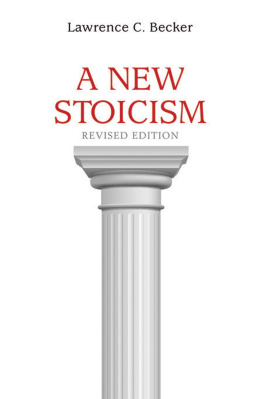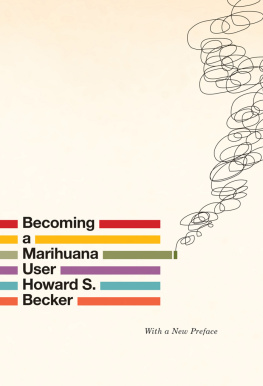THE
NIGHTLESS CITY
GEISHA AND COURTESAN LIFE IN OLD TOKYO
J. E. DE BECKER
Virtuous men have said, both in poetry and classic works, that houses of debauch, for women of pleasure and for street-walkers, are the worm- eaten spots of cities and towns. But these are necessary evils, and if they be forcibly abolished, men of unrighteous principles will become like ravelled thread.
73rd section of the Legacy of Ieyasu, (the first Tokugawa Shogun)
ILLUSTRATED
DOVER PUBLICATIONS, INC.
Mineola, New York
Bibliographical Note
This Dover edition, first published in 2007, is an unabridged republication of the revised fifth edition of the work originally published c. 1910 by Max Nssler & Co., Yokohama, and Probsthain & Co., London, under the title The Nightless City: Or theHistory of the Yoshiwara Ykwaku. The first edition was published in 1899 by Z. P. Maruya & Co., Ltd., Yokohama. The only significant alterations for the Dover reprint consist in reducing the three foldout plates so they fit on two-page spreads; and reproducing all the illustrationsincluding those in colorin black and white.
International Standard Book Number
eISBN 13: 978-0-486-12281-6
Manufactured in the United States of America
Dover Publications, Inc., 31 East 2nd Street, Mineola, N.Y. 11501
List of illustrations.
Courtesans Viewing Cherry Blossoms.
Map of the Yoshiwara in 1846.
PREFACE TO THE FIRST EDITION.

O long as the human race shall last, so long as human appetites demand illegitimate gratification, so long as human blood shall course hot in the veins, so long as men have passions, so long as women are frail, so long as illicit pleasure has attraction for bewildered wallowing humanity, and so long as lustthe headstrong beast stalks through the earth, venery and dissipation will undoubtedly continue to claim thousands of unhappy victims.
Vice, like disease, floats in the atmosphere, and notwithstanding the strenuous efforts which have been made in all countries and ages to eradicate prostitution, it still exists rampant and invincible.
History demonstrates the sad truth that all human efforts have beenand probably will ever be unequal to the task of stamping out the social evil from our midst, and we are therefore forced to recognize that the most we can hope to achieve in the direction of ameliorating its consequences is to regulate and control its worst features.
Many and earnest have been the vain attempts of European reformers to grapple with the evil, but their efforts have invariably ended in disappointment. The Church has thundered and anathematized, the secular authorities have enacted severe and even cruel laws, but the courtesan still survives and will doubtless survive and flourish until the waters of Time have engulfed the World.
Japan has not stood still among the nations in her endeavour to solve the problem of prostitution, and the present system of legal control is to all intents and purposes a development of that inaugurated well-nigh three centuries go.
While admitting the existence of objectionable features in the Yoshiwara, it is evident that a system which has stood the test of three hundred years must possess some good points to account for its long lease of life, and it is also manifest that in the course of three centuries a great many curious customs some good, some badmust have crystallized around the institution.
Being no partizan or special pleader, I have simply confined myself to what I believe to be assured facts, and hope that the contents of the volume will be of interest and service to persons who are anxious to impartially investigate the customs of one of the most remarkable institutions in this country. I have compiled this book with the object of providing foreign students of sociology, medical men, and philanthropists, with some reliable data regarding the practical working of the system in the leading prostitute quarter of the Japanese Metropolis, and I leave my readers to form their own opinions as to the pros and cons of the success or otherwise achieved by the plan of strict segregation adopted in this country.
To Japanese who may think that the Yoshiwara is a disgrace to Japan I would remark that this Empire has by no means a monopoly of vice ; and to foreigners who declaim against the immorality of Japanese I would say frankly Read the History of Prostitution by Dr. W. W. Sanger of New York, also the Maiden Tribute of Modern Babylon which appeared in the Pall Mall Gazette fourteen years ago. You cannot afford to criticize this country too closely, for you certainly dare not lay the flattering unction to your souls that you, as a race, have any monopoly of virtue.
T HE A UTHOR .
Tky, 1899.
PREFACE TO THE FIFTH EDITION.

UBSEQUENT to the anonymous publication of the first edition of
The Nightless City in 1899, the author was severely remonstrated with by certain unctuous persons for writing a work which lays bare a phase of Japanese social phenomena before which all writers (with the notable exception of Mr. Henry Norman) have studiously drawn a veil. To this class of persons he neither owes, nor offers an apology; but, in order to obviate any misunderstanding of his motives, it may be well to explain the
raison dtre of the book.
The voluminous data on which is based the science of Medical Jurisprudence, the records of all Courts, and the experience and common knowledge of mankind, prove the universal existence of the social evil to be a present and undeniable fact.
History shows that from the earliest ages society was never free from the devastating influences of a vice which arises from an apparently inextinguishable natural impulse inherent alike in human beings and in the lower creation. Wrap ourselves up as we may in a mantle of prudery, refuse as we may to recognize the evil, it is still there, and like the poor, it will probably be with us always.
We can no more hope to eradicate or suppress it than to control an earthquake or harness the winds and waves! Its existence being thus palpable, is it not far wiser to frankly recognize and investigate the phenomenon with a view to control, by judicious regulations, the current of the vice and direct it into channels where it may be, at least to a certain extent, grappled with and arrested, than to foolishly close our eyes and refuse to discuss the subject on the cowardly plea that we may possibly disturb the conventionalities by publicly and fully investigating the evils of prostitution ?
The author utterly denies the proposition that there can be any impropriety in enquiring into the facts of a matter which virtually affects, either directly or indirectly, the whole community; on the other hand he affirms that much good may be done by collecting facts and statistics which may prove of value to the legislator, the philanthropist, and the clergy. Without adequate data, how can we ever hope to devise measures of a preventative or ameliorative nature, and how can such data be obtained if we are all to be deterred from necessary investigations by the mawkish sensibility of Mrs. Grundy?


 O long as the human race shall last, so long as human appetites demand illegitimate gratification, so long as human blood shall course hot in the veins, so long as men have passions, so long as women are frail, so long as illicit pleasure has attraction for bewildered wallowing humanity, and so long as lustthe headstrong beast stalks through the earth, venery and dissipation will undoubtedly continue to claim thousands of unhappy victims.
O long as the human race shall last, so long as human appetites demand illegitimate gratification, so long as human blood shall course hot in the veins, so long as men have passions, so long as women are frail, so long as illicit pleasure has attraction for bewildered wallowing humanity, and so long as lustthe headstrong beast stalks through the earth, venery and dissipation will undoubtedly continue to claim thousands of unhappy victims. UBSEQUENT to the anonymous publication of the first edition of The Nightless City in 1899, the author was severely remonstrated with by certain unctuous persons for writing a work which lays bare a phase of Japanese social phenomena before which all writers (with the notable exception of Mr. Henry Norman) have studiously drawn a veil. To this class of persons he neither owes, nor offers an apology; but, in order to obviate any misunderstanding of his motives, it may be well to explain the raison dtre of the book.
UBSEQUENT to the anonymous publication of the first edition of The Nightless City in 1899, the author was severely remonstrated with by certain unctuous persons for writing a work which lays bare a phase of Japanese social phenomena before which all writers (with the notable exception of Mr. Henry Norman) have studiously drawn a veil. To this class of persons he neither owes, nor offers an apology; but, in order to obviate any misunderstanding of his motives, it may be well to explain the raison dtre of the book.











